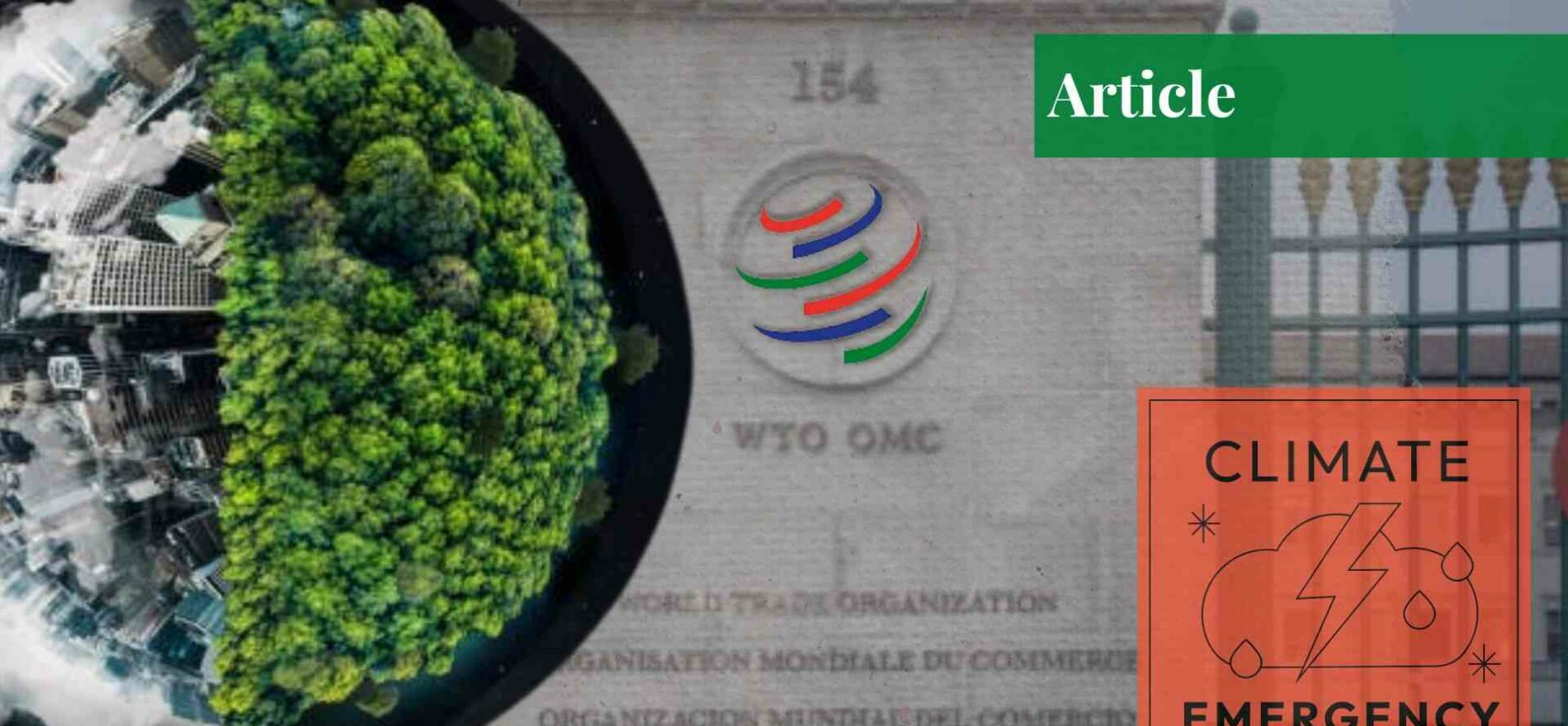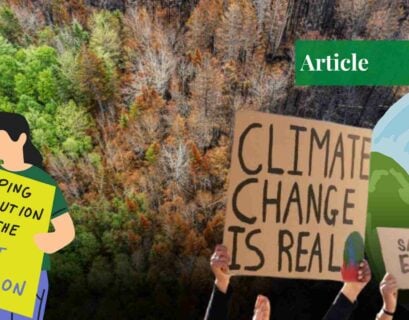She is a graduate of International Relations from Quaid-e-Azam University Islamabad.
According to the IMF, the coal, oil, and gas industries benefit from $5 trillion annually. With a vested interest in tapping such resources, the West puts its utmost effort into turning the world against climate science by funding think tanks, research organizations, and other such networks. This article analyzes the consequences of this conspiracy in affecting the global governance over climate change by carving out the reasons behind this conspiracy by taking the World Trade Organization (WTO) as a case study.
Factors Hampering Global Governance Over Climate Change
North-South Divide
It is believed by the developing countries that the South, due to its terrain, is most affected by the changes in climate. The North, solely responsible for the upcoming climate crisis, remains impervious to it. As they are the ones who contribute the maximum emissions to the environment, they should also be the ones burdened to mitigate its effects.
The Global South further maintains that attempts from institutions backed by developed nations to reform their national policies in compliance with environmental standards are developed nations’ neo-colonial efforts to hinder developing countries’ progress to sustain their dominance, as expounded by Johan Galtung in his “structural theory of imperialism.” Using his theory further, they claim that developing nations should have a “bottom-up approach” to improving themselves and come on par with the North.
However, this approach is difficult to adhere to because of the South’s divisions and lack of interest harmonization. For example, oil-producing states—with their economies dependent heavily on oil and deforestation—such as Brazil diverge from the stance of coalitions such as AOSIS (Alliance of Small Island Countries) and other nations most vulnerable to climate change.
The Amazon rainforest fire raised concern among the masses, resulting in public protests, with activists blaming Brazilian President Jair Bolsonaro’s controversial environmental policies of tapping Amazon to explore economic potential. The resistance to environmentally friendly policies is potent from fossil fuel enterprises due to their immense stakes in the industry.
Furthermore, there is also a division within the North over climate change. On the one hand, there is a faction that includes the US, Russia, China, and more with high stakes at a domestic level if they adopt climate policies. On the other hand, Canada, the European Commission, Scandinavia, Australia, and New Zealand advocate for stabilizing emissions.
Japan, which mostly sides with the US, is receding from its pro-US stance over climate change due to its possible commercial advantage in an energy-efficient world. Being the most energy-efficient country in the industrial sector, Japan argued that the United Nations Conference on Environment and Development (UNCED) provides a platform through which it can play a prominent role in leading the world toward sustainable growth by exporting ecologically-friendly technology and production processes to developing countries.
However, countries like the US and Russia consider such environmental regulations quite costly. Russia even sees an opportunity in the upcoming climate crisis—the opening of the Arctic passage due to melting ice. Meanwhile, the US, the world’s second-largest carbon dioxide emitter, the third-largest coal producer, and the largest natural gas producer, sees a very high cost in reducing greenhouse gas (GHG) emissions.
These differences in opinions and interests between North and South are one of the prime reasons for receding cooperation and collaboration at the global level in reaching climate consensus.
Amok Capitalism—Lack of Climate Action
Of late, the role of different non-state actors, such as multi-national corporations (MNCs), in overturning cooperation at a state level to redeem the effects of climate change has focused attention on the concerns that Marx foreboded in his writings—about the amok exploitive nature of capitalism. A concept in which few decide the fate of many by having economic power.
Ralph Miliband, a Marxist, has taken this view further and presented a collaboration between the state and corporate elites in his writings. He expounded that with the monopolization of power in few hands, the influence of the capitalist class grew to a level that would ultimately steer the state—implicitly or explicitly in its favor. As the growth of corporations ultimately affects the state’s growth, the state acts to further the interests of the capitalist class at the expense of the majority.
The practical implementation of this notion can be seen by viewing the role of oil companies in docking climate change. These private corporations are pressuring states and funding think tanks and research organizations to deny climate change. They have been using different branding and lobbying groups, like the Global Climate Coalition (GCC), the Cato Institute, the Heritage Foundation, and the Heartland Institute, to block climate change policies or to deny the reality of its existence.
A report estimates that over $1 billion is spent by the five largest oil and gas companies (Exxon Mobil, Chevron, BP, Total, Shell, and Royal Dutch) denying climate change following the Paris Agreement. Not only that, they also work to alter the broader cognitive attitudes of the masses toward climate change by manipulating social media and news channels, etc.
This lobbying, opposition, and influence of non-state actors in shaping the state’s stance toward climate change is a major hindrance in global efforts toward cooperation over this serious issue.
Great resistance is shown by bigger corporations having billions of dollars in stakes regarding environmental policies. They pressure states to further their interests in international institutions. Miliband asserts that the cooperative link between the state and corporations is in the collective exploitation of the environment and resources.
The WTO and Global Environmental Governance
The commodification of the environment has resulted in the pinnacle of exploitation. It has been made clear that reforms are needed in the WTO—a global governing body for trade—to shackle capitalism’s inherent amok exploitive nature. There is a need for enhanced collaboration with WTO, as works mostly on trans-border trade liberalization.
Trade can play a role in carbon emissions. Still, the problem is not stopping the trade, but rather making it compliant with environmental policies to fight climate change because most of the world’s anthropogenic contributions stem from the trade of cost-externalizing products between states.
According to International Maritime Organization (IMO) estimates, emissions from international shipping were responsible for 2.2% of global anthropogenic contributions in 2012. If no action is taken, this figure could rise 50-250% in 2050. Other factors include strip mining of forests, soils, biological resources, etc.
The WTO believes in promoting liberalized trade, through comparative advantage, driven by the self-interested relative gains of those who tacitly steer it by having the power to influence its pattern of decision-making. Due to the broad array of stakeholders, dispute resolution hearings, judgments, and decisions about environmental disputes are closed and highly secretive, resulting in illegitimate and biased decisions. Under this scenario, the rules and procedures of the WTO have adversely weakened environmental regulations.
One of the reasons behind the weakening of environmental regulations is the flow out of foreign investment and the migration of producers to areas called “pollution havens.” The liberalization norm of WTO often clashes with climate and environmental policies and creates hindrances in meeting the “nationally determined contributions” (NDCs) target. The US, Canadian, and German Governments faced legal action for environment-related regulations by different companies.
Another challenge to eco-friendly measures is that states can use environmental protectionism to pursue their ulterior motives. Therefore, environmental concerns in the WTO are often shunted away. National policies are throttled by global competitive pressure and environmental regimes put forth by the WTO. However, there is a faction of environmentalists who believe that the WTO should be greened from the inside out or that environmental regimes should be strengthened to such an extent that they can withstand the side effects of trade hyper-liberalization.
As climate change has a global impact and is not restricted to a particular region or state, collective action against it is imperative to manage it. International cooperation is vital to mitigate climate change. For that purpose, environment-friendly global trade provisions are required. It would do no good if an eco-unfriendly product is banned if it is still manufactured domestically for export or is imported.
The WTO should take certain measures to support the transition toward a low-carbon economy:
-
- Standards and technical regulations should be set according to environmental requirements.
-
- Low-carbon products should be given priority for imports.
-
- Tariffs or trade barriers on low-carbon products should be low.
-
- Climate waiver measures should be taken at the WTO.
-
- The WTO members should invest in green projects.
-
- WTO should collaborate with IMO and the International Civil Aviation Organization (ICAO) to reduce emissions in the sea transport sector.
-
- There should be procedural changes within the WTO that would guarantee expertise on climate change in dispute settlement panels.
-
- The WTO should be strengthened to whittle the influence of the Global Climate Coalition.
-
- There should be enhanced collaboration between WTO and the United Nations Framework Convention on Climate Change (UNFCCC) to work more intensively on areas of convergence.
-
- Foreign trade agreements (FTAs) can also help countries adopt climate-friendly measures at a domestic level.
-
- Plurilateral and regional trade agreements should encourage countries to adopt climate-friendly policies and must include climate-friendly provisions.
-
- The WTO should work on border carbon adjustments (BCAs).
-
- Under BCAs, tax relief can be applied to exports and emission purchase allowances can be set. Climate can be commodified through such trading schemes.
-
- The WTO can also play its role in curbing climate change through cooperation between developed and developing nations under the Trade-Related Aspects of Intellectual Property Rights (TRIPS) Agreement. Under it, developed countries will incentivize developing countries by disseminating eco-friendly, low-carbon technologies.
Conclusion
Despite having ample reason to prove the logic of climate change, receding global governance reflects the dual nature of the world. The nature of climate change is multi-dimensional and exponential, due to which different states respond differently to the issue, affecting their collaboration over both trade and climate change.
The lack of a collective body to address the issue is also one of the reasons behind the lack of cooperation. Collaboration between the environmental and trade regimes is important because the anthropogenic environmental contribution is mostly linked to the trade of products whose production process emits GHG gases. Through this collaboration, the capitalist class within the state can adopt eco-friendly measures in its production process by giving incentives in the form of a floating tender to those who succumb to the standards set by environmental regimes.
Environmental regimes should work alongside the WTO to effectively implement its policies. For that purpose, environmental protectionism is seen as a constructive means to internalize the costs of ecological degradation that take place due to the amok exploitation of the environment by the capitalist class. Herman Daly calls it “an efficient national pricing of full-cost pricing.”
Furthermore, trade policies, negotiations, and agreements among states can be used to promote environmental standards at a national level. Many attempts have been made in retrospect for the greening of trade rules. Voices for greening trade rules particularly gained momentum after the 1992 Earth Summit.
The consensus over environmental policies was hindered because of the lack of a global environmental regime and a grand strategy for global environmental protection. Instead of presenting the “environmental problem” within the ambit of a single platform, it is taken individually—the Montreal Protocol, CITES (Convention on International Trade in Endangered Species), Kyoto Protocol, Basel Convention on Hazardous Waste, and many more—which produces narrow technical agreements rather than a broader political consensus over the fundamental issue.
Also, eco-friendly commodities are to be encouraged by making them more competitive in the international market. This can be done by reducing trade barriers and adding climate waivers. To implement these steps, first, there should be a global consensus that harmonizes interests. This is the only path to sustainable development that can mitigate the impacts of climate change.
If you want to submit your articles and/or research papers, please check the Submissions page.
The views and opinions expressed in this article/paper are the author’s own and do not necessarily reflect the editorial position of Paradigm Shift.


















